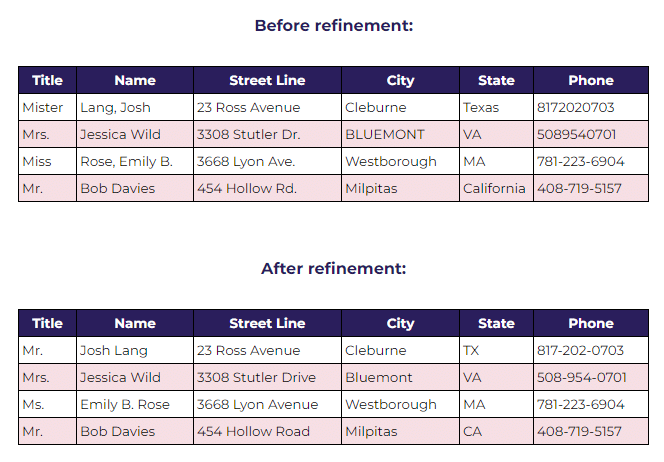
Did you know most analysts spend 50 to 80 percent of their time refining their data than any other function in the data lifecycle? Even when we include other steps like data extraction, data analysis, and data visualization?
We’ve talked at length about the importance of data for your business. The only thing we’ve emphasized more is the quality of that data, or in other words, the refinement it is put through before sending it over for downstream analysis.
Bad data is no better than no data.
Mel Netzhammer, Washington State University
Data refinement is the less glamorous side of data science that standardizes, aggregates, categorizes, and analyzes raw data to gain actionable insights. Most refinement models use statistical modeling to transform heaps of crude data into something usable.
Data refinement: before and after
In its simplest form data refinement is the process of making a dataset more legible. This before and after image of a sample dataset should give you a clear idea about the importance of data refining.

One of the major aspects of quality data is its consistency. At Grepsr, we use best industry practices like data normalization. It ensures that corresponding data fields share similar characteristics in a standard format throughout the dataset.
Data normalization has extensive applications in retail and E-commerce, ranging all the way from augmenting customer experience to enhancing brand image.


As the number of datasets you have to work with increases, the process of data refinement convolutes and you’ll have to adopt advanced data wrangling techniques to make the most out of the data at your disposal.

Why data refinement is important for your business
Now that you know the significance of data refinement, let us attempt to understand how it can benefit your business. The importance of refined data makes immediate sense when you comprehend the consequences bad data can have on your business. Every time a bad batch of data escapes your quality control, it comes back to haunt you with interest later.
Data refinement helps you:
1. Save time
Data refinement empowers data analysts to do what they do best – data analysis. More often than not, data refinement demands human intervention. No wonder, analysts spend 50 to 80 percent of their time refining data!
With the rigorous task of data refinement out of the way, data analysts can spend their valuable time extracting insights to bolster your output.
2. Make better decisions
Whether you want to monitor prices on an E-commerce platform or thoroughly analyze real estate listings, data refinement endows you with actionable data to make informed decisions.
3. Gain deeper intelligence
The process of gleaning actionable insights from any given dataset is much like extracting iron from its ore. When the data is refined, it brings hidden information into sight. It even uncovers patterns previously buried in a deluge of illegible raw data.
4. Get actionable insights
When your data has been put through data refinement you can rest assured that it is accurate and actionable. What only remains to be seen is if there’s more you can do with it. Or, if you can collect more data and vet it the same way to uncover more ways of solving the problems plaguing your business.
About Grepsr
Data extraction service has always been our forte. During our establishment’s initial years, we discovered that for data to be treated as a commodity, it had to be refined. So we fashioned ourselves not just as data collectors but as a data refinery as well.
Most of our clients deploy their data to downstream analysis without worrying about the contamination after they get it from us.
We understand the importance of clean and fresh data for your business. It is one of the reasons why our partners keep coming back to us.
Related reads:













